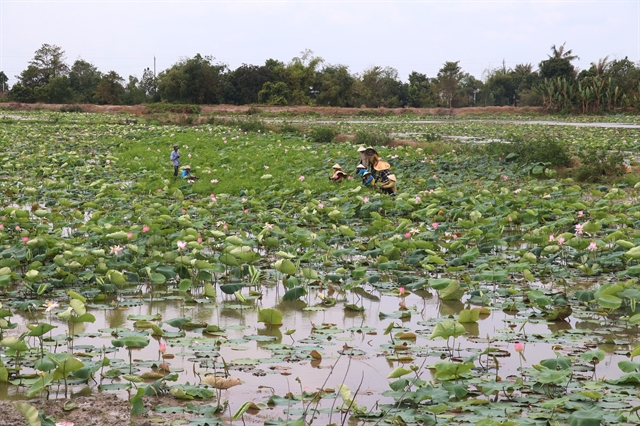 |
| Lotus fields in Đồng Tháp Province’s Tháp Mười District. – VNA/VNS Photo Nguyễn Văn Trí |
ĐỒNG THÁP – Đồng Tháp Province aims to develop lotus cultivation sustainably to produce high quality products for export and improve farmer incomes.
Located in the Đồng Tháp Mười (Plain of Reeds) region, the Cửu Long (Mekong) Delta province has many ponds, lakes and wetland areas which are favourable conditions for cultivating the plant.
It is the delta’s largest lotus growing province with 1,838ha as of the end of last year, exceeding 31 per cent of its target set for 2025, according to the Department of Agriculture and Rural Development.
The department, in co-operation with relevant agencies, has selected and created 52 lotus varieties which are grown for harvesting flowers, pods, stems or roots, or making ornamental plants.
Farmers who grow lotus for harvesting pods earn an average profit of VNĐ100 million (US$3,900) per hectare during the five-month crop.
Nguyễn Thành Dũng in Thanh Bình District’s Tân Mỹ Commune said he gets a yield of 7-8 tonnes of pods per hectare per crop.
“The profit of growing lotus is two to three times higher than that of rice,” he said.
Lotus is identified as one of five key agricultural products under the province’s agricultural restructuring plan for 2021-25.
The province has set up measures to develop the plant to become a key agricultural product, which has advanced technologies, brand names and origin traceability.
The measures will also improve the quality of lotus products and develop lotus-related tourism products under the country’s “One Commune-One Product” programme.
The province will also develop specialised lotus growing areas, mostly in Tháp Mười, Cao Lãnh, Châu Thành, Thanh Bình, Tân Hồng and Tam Nông districts.
Tháp Mười, which is the province’s largest lotus growing district, aims to have 1,000ha of the plant and five specialised growing areas next year.
Trần Văn Nhãn, deputy director of the province’s Centre for Agricultural Services, Irrigation Work Exploitation and Management, and Rural Clean Water, said to assist farmers accessing farming processes that grow lotus sustainably and have high quality, the province is implementing exemplary farming models.
One model is a 100ha lotus farming area in Tháp Mười District, which uses an organic method, applies mechanisation and technologies of Industry 4.0, has linkages among stakeholders in producing and selling, and provides experimental tourism services.
Other models include a 3ha lotus farming area for harvesting roots in Tháp Mười, and a 2ha fish-lotus farming area in Tam Nông District.
They have helped farmers access modern farming models, improve quality and diversify lotus products, Nhãn said.
The department has provided farmers methods of managing diseases and growing the plant under good Vietnamese agricultural practices and organic standards.
It is boosting the development of linkages between farmers and companies to improve lotus quality and secure sales for farmers.
Farmers now sell lotus mostly to traders.
The province has 30 lotus processing companies which produce 120 lotus-related food and cosmetic products.
It has 59 OCOP products and 200 dishes and beverage items which are made from lotus. – VNS


